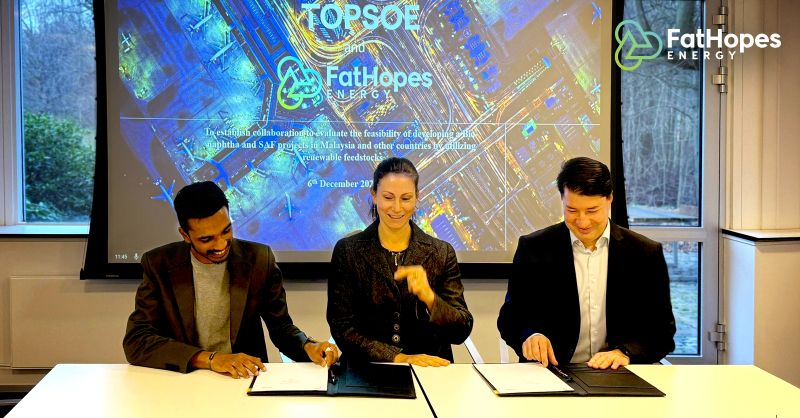FatHopes Energy (FHE), a pioneer in biofuel feedstock aggregation, has partnered with Topsoe, a Danish leader in carbon reduction technologies. The two companies signed a Memorandum of Understanding (MoU) to explore the development of a sustainable aviation fuel (SAF) refinery in Malaysia.
The project will utilize renewable feedstocks, such as used cooking oil (UCO) and other waste-based oils, to produce advanced aviation biofuels. This effort aims to contribute to the global decarbonization of the aviation sector.
Under the MoU, Topsoe will supply its technologies, including catalyst solutions and engineering expertise, to assess the refinery’s feasibility. The first phase will involve a comprehensive feasibility study to evaluate Malaysia’s suitability for the state-of-the-art SAF facility.
FatHopes Energy will leverage its expertise and extensive network to ensure a reliable supply chain of waste-based raw materials. The developed facility may be operated by FatHopes Energy or licensed to a third-party operator for commercialization.
This project is expected to meet domestic SAF requirements and support Malaysia’s transition to sustainable energy sources. Additionally, the specific use of palm oil materials as SAF feedstocks can comply with sustainability certifications, depending on regulations.
The MoU aligns with Malaysia’s strategic goals to diversify energy streams and lower its carbon footprint. Establishing a SAF refinery can position Malaysia as a leader in sustainable energy, attracting global investments and promoting advancements in the biofuels market.
Milica Folic, Product Line Director at Topsoe, emphasized the commitment to accelerating the energy transition. “By combining Topsoe’s HydroFlex® technology with FatHopes Energy’s expertise, we are initiating a transformative project,” she stated.
Vinesh Sinha, CEO of FatHopes Energy, described the partnership as a new era for the organization. “We aim to aggregate and convert waste streams into biofuels to decarbonize industry at scale,” he said.






